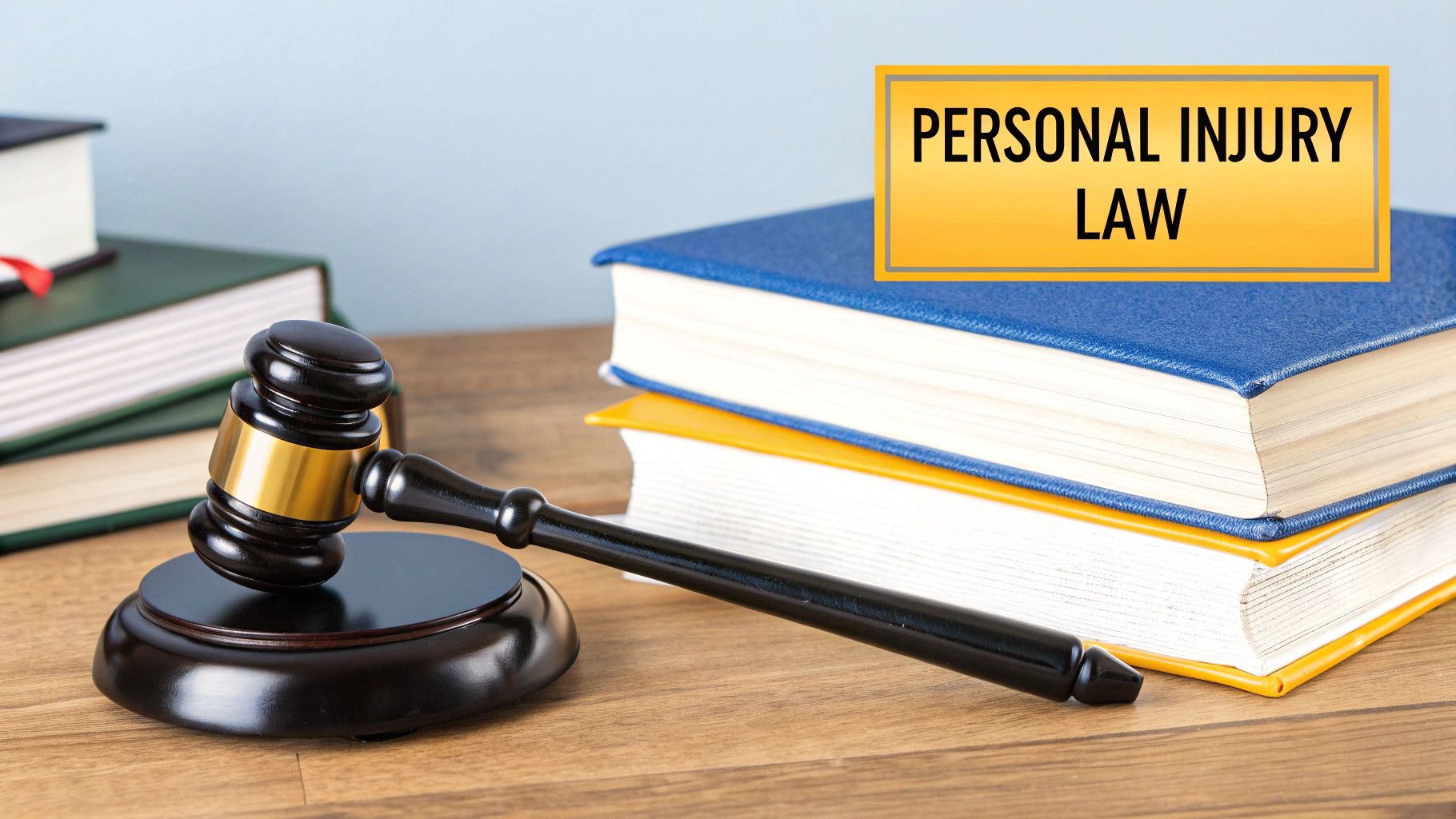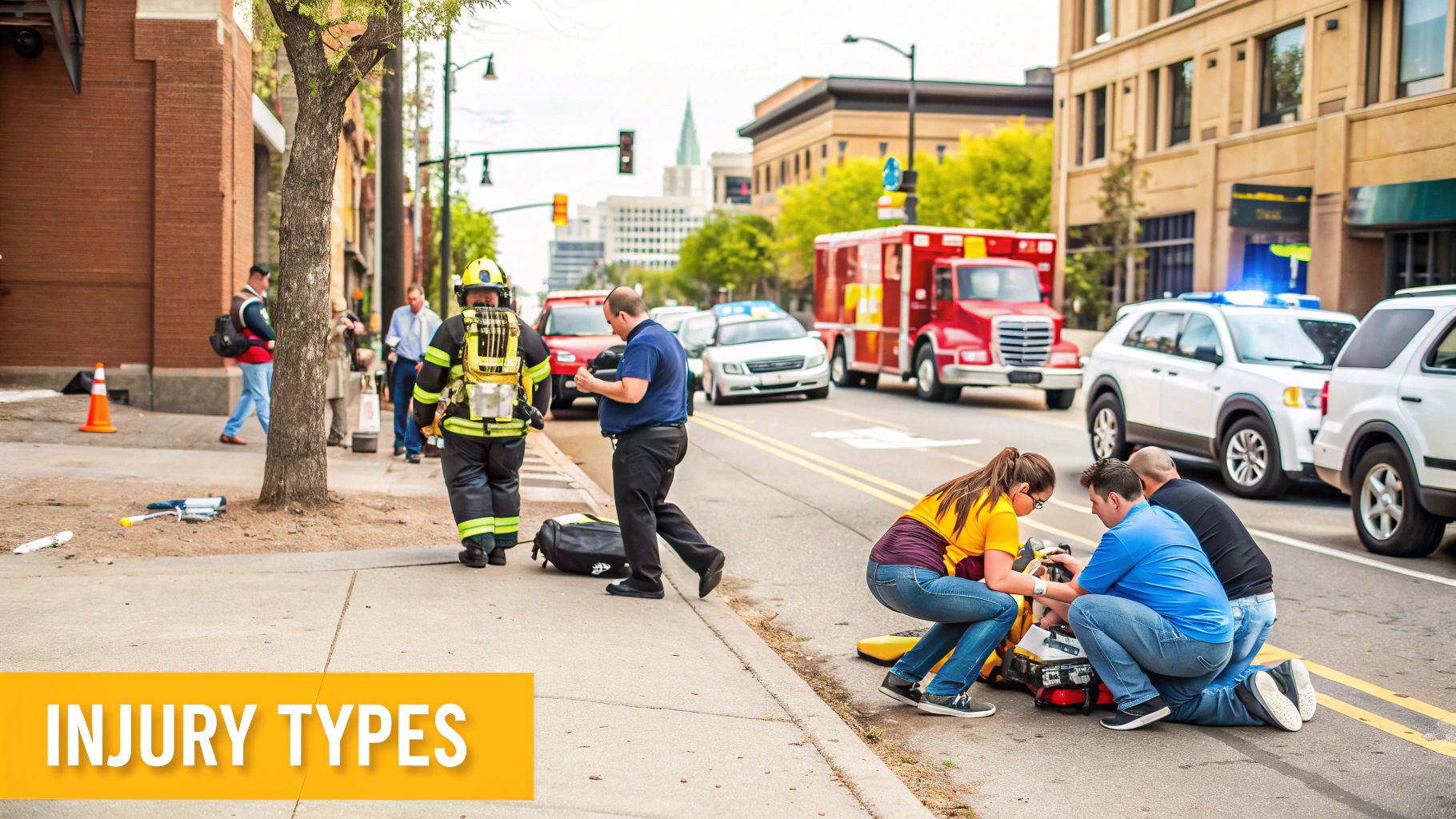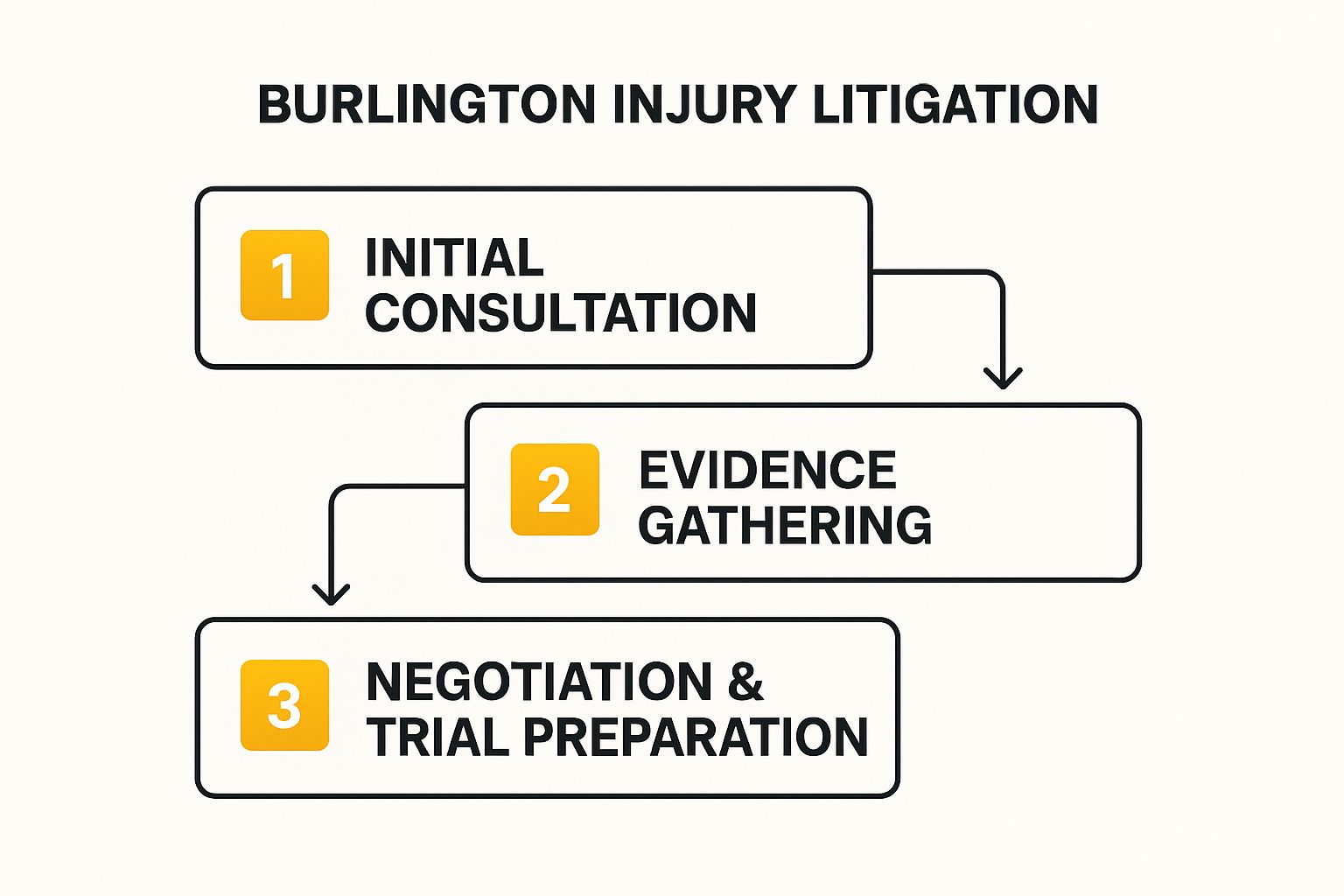Finding Burlington Injury Lawyers You Can Trust
When you’ve been hurt, the moments and days that follow are a blur of confusion and pain. What you do right away is absolutely critical. Your health is, of course, the number one priority, but the actions you take to document the incident and protect your legal rights are a very close second. These early steps lay the groundwork for a successful claim, and they’re exactly what experienced Burlington injury lawyers will look for.
What to Do Immediately After an Injury in the GTA

The minutes after an injury—whether it’s a fall at a grocery store in Burlington or a crash on the QEW—are overwhelming. It’s tough to think clearly, but what you do next can make a huge difference for both your physical recovery and your ability to seek compensation under Ontario law.
Look After Your Health and Safety First
Before anything else, get medical help. This seems obvious, but it’s easy to brush off what feels like a minor injury when you’re in shock. Adrenaline can mask serious problems like concussions or internal injuries that don’t show symptoms right away. Seeing a doctor creates an official medical record linking your injuries to the incident, which is a cornerstone of any personal injury claim.
Next, make sure the incident is officially reported. If it was a car accident, that means calling the police. If you slipped and fell, you need to notify the property owner or manager immediately. This creates an official report that documents the who, what, where, and when.
Document Everything You Possibly Can
Evidence has a way of disappearing. Memories fade, and scenes get cleaned up. So, while you’re there (if you’re able), start documenting.
Pull out your phone and take photos and videos of everything: the location, your injuries, any property damage, the weather conditions, or the hazard that caused you to fall. If anyone saw what happened, ask for their name and phone number. A witness’s account can be incredibly powerful because it’s an impartial view of the events.
A simple tip I always give my clients is to start a journal that same day. Write down everything you remember about the accident itself. Then, keep logging your daily pain levels, your doctor’s appointments, and all the ways the injury is affecting your day-to-day life. This detailed, personal account can become invaluable down the road.
You’ll also want to start a file for every single piece of paper related to the incident. Don’t throw anything away. This includes:
- Receipts for prescriptions, physiotherapy, or other treatments not covered by OHIP.
- Emails or letters from your work about time you’ve had to take off.
- Quotes or invoices for repairing your car or other damaged property.
This paper trail is the bedrock of your claim. For a more comprehensive checklist, our guide on what to do after a car accident in Ontario is a great resource.
One final piece of advice: be very careful when the insurance adjuster calls. They will likely try to get a recorded statement from you quickly. You don’t have to give one right away. It’s almost always better to speak with a lawyer first, so you don’t accidentally say something that could be used to undermine your claim later.
How to Evaluate a Lawyer’s Experience and Specialisation

When you start your search for Burlington injury lawyers, you’ll quickly notice that “personal injury” is a common offering. But here’s something you need to understand: a lawyer who handles injury claims alongside real estate deals and corporate contracts simply won’t have the sharp, focused insight of a true specialist.
Real expertise in this field is built by handling these types of cases day in and day out. A dedicated personal injury lawyer knows the playbook that Ontario insurance companies use to lowball victims. They’ve built relationships with the right medical experts to properly document your injuries and have spent years navigating the court systems in Burlington and the GTA.
Looking Beyond Years of Practice
It’s easy to get hung up on how long a lawyer has been practising, but that number can be misleading. What really counts is their hands-on experience with cases just like yours. A lawyer who has successfully resolved hundreds of QEW car accident claims or slip-and-fall incidents in Halton Region is leagues ahead of a generalist who has been practising longer but has only touched a few injury files.
You want someone who lives and breathes Ontario’s Insurance Act and the Occupiers’ Liability Act. That singular focus means they can spot potential problems before they arise, build a much stronger case, and fight more effectively for the full compensation you are entitled to.
The real test of a lawyer’s experience is not how many years they’ve been practising, but how many times they’ve successfully guided a client through the exact same legal battle you’re now facing.
Verifying a Lawyer’s Specialisation and Reputation
So, how can you be sure you’re talking to a specialist? Start on their website. Dig into their case results and practice area descriptions. Are they specific? Do they talk about the very types of injuries and accidents you’re dealing with, like motor vehicle collisions, long-term disability claims, or pedestrian accidents?
Next, look for what past clients have to say. Testimonials and reviews are a goldmine of information, offering a glimpse into a lawyer’s communication style, professionalism, and, most importantly, their ability to get results. Hearing directly from people who were in your shoes is one of the best ways to see if a firm is the right fit. You can see what this looks like by reading client reviews and testimonials that highlight a firm’s track record.
When you have that first conversation, don’t be shy. Ask pointed questions:
- What percentage of your caseload is dedicated to personal injury?
- Have you handled cases involving injuries similar to mine?
- Can you walk me through a recent successful outcome you achieved in a comparable situation?
A genuinely experienced personal injury lawyer will welcome these questions and answer them with confidence and transparency. That’s how you’ll know you’re in the right hands.
Making Sense of Legal Fees and Retainer Agreements
Let’s talk about money. It can be an awkward conversation, but when you’re hiring a lawyer, it’s one of the most important ones you’ll have. You need complete transparency from the start to build a solid, trusting relationship with your legal advocate.
Thankfully, when it comes to personal injury law in Ontario, the way lawyers get paid is designed to help you, not hinder you.
The standard is a contingency fee agreement. It’s a straightforward concept: your lawyer only gets paid if they win your case. No settlement, no legal fees. This approach levels the playing field, making sure anyone can get expert legal help, no matter their financial situation.
Getting Clear on the Fine Print
So, how does it work? The lawyer’s fee is a percentage of the final settlement or court award. This percentage isn’t a surprise—it’s clearly defined in the retainer agreement, which is the formal contract you sign with the law firm. The Law Society of Ontario has strict guidelines to make sure these agreements are fair and written in plain language.
But the percentage isn’t the only number to consider. You also need to ask about disbursements. Think of these as the necessary out-of-pocket costs to move your case forward, separate from the legal fees. This can include things like paying for medical expert reports, court filing fees, or accident reconstruction analysis.
Understanding these costs is just as crucial as knowing the fee percentage. The process and costs are quite similar across the region; our guide on hiring a personal injury lawyer in Hamilton, Ontario offers more insights that apply here too.
A good lawyer will never shy away from the money talk. They should sit down with you, go through the retainer agreement line by line, and make sure you understand every detail before you even think about signing.
To ensure there are no surprises down the road, it’s wise to have a checklist of financial questions ready for your initial consultations.
Key Questions to Ask About Legal Fees
Use this checklist during your initial consultation to understand the financial commitment with any potential Burlington injury lawyer.
| Question Category | Specific Question to Ask | Why It’s Important |
|---|---|---|
| Fee Structure | What is your exact contingency fee percentage, and is it subject to HST? | This is the core of your agreement. You need to know the precise percentage that will be deducted from your final settlement. |
| Case Scenarios | Does the percentage change if the case settles early versus if it goes all the way to a trial? | Some agreements have a tiered structure. Clarifying this helps you understand how the final outcome affects the fees. |
| Disbursements | Can you give me an estimate of the disbursements you anticipate for a case like mine? | While an exact figure isn’t possible, an experienced lawyer can provide a realistic range for costs like expert reports and court fees. |
| Payment of Costs | Who pays for the disbursements as they come up? Does the firm cover them, or are they deducted from my final settlement? | This clarifies the cash flow of your case. Most reputable firms cover these costs upfront and recover them from the final award. |
Asking these direct questions from the get-go helps you find a lawyer who is not only skilled but also transparent and trustworthy. It’s your case and your money—you deserve to have all the answers.
Getting Ready for Your First Lawyer Meeting
Think of your free consultation as more than just a chat—it’s an interview. You’re not just telling your story; you’re sizing up the person who might represent you. This is your chance to get a feel for their expertise, how they communicate, and their initial thoughts on a strategy. Walking in prepared puts you in the driver’s seat.
The best way to prepare is to get your documents in order. While the details are still fresh in your mind, start pulling together everything related to your injury. This groundwork gives a lawyer a clear picture of your situation right from the start, which means they can give you a much more accurate first opinion.
What to Bring to the Consultation
The more organised you are, the more you’ll get out of this first meeting. Think of it as laying the groundwork for your entire claim.
- Official Reports: If you were in a car accident, bring the police report. For a slip and fall, any incident report filed with the property owner is key.
- Medical Documents: This includes everything from hospital discharge papers and doctors’ notes to receipts for prescriptions. It’s also helpful to jot down a simple list of every doctor, clinic, or therapist you’ve seen.
- Photos and Videos: Visuals are incredibly compelling. Bring any photos or videos you have of the accident scene, your injuries as they healed, and any damage to your vehicle or property.
- Proof of Financial Impact: Collect pay stubs to show your lost income. Also, gather receipts for any expense you’ve paid out-of-pocket, like physiotherapy, crutches, or parking at the hospital.
You don’t need a perfectly organised, complete case file at this stage. The goal is to provide a solid overview. Even a simple timeline of events you’ve written down can make a huge difference in helping a lawyer understand the core facts.
The Right Questions to Ask
This meeting isn’t just about the facts of your case; it’s about finding out if this is the right legal partner for you. You need to ask questions that show you how they work and what you can expect if you hire them. The best Burlington injury lawyers will have clear, straightforward answers.
For a deeper dive, you can learn more about what to look for in our guide to finding the right injury lawyer in Burlington.
Trust your gut and watch for red flags. Does the lawyer seem evasive? Do they brush off your questions or, worse, pressure you to sign a retainer right then and there? If so, it’s a clear sign to keep looking. You want someone who makes you feel heard, respected, and confident in their ability to handle your case. This is a partnership, and you need a trusted advocate for the road ahead.
What to Expect in the Ontario Personal Injury Claim Process
So, you’ve found one of the best Burlington injury lawyers to champion your case. What happens now? The legal journey that follows can seem intimidating, but a good lawyer will walk you through it, making sure you understand what’s coming next.
Right out of the gate, the focus is all on building your case. This means your legal team gets to work gathering every piece of evidence they can find. We’re talking police reports, all your medical records, and detailed witness statements. Sometimes, they’ll even bring in specialised experts—like accident reconstructionists or medical professionals—to strengthen the claim.
The goal here is simple: to draw an undeniable line between the other party’s carelessness and the injuries you’re dealing with.

This process, from gathering evidence to negotiating a resolution, is a structured path designed to build momentum and put you in the strongest possible position.
Key Milestones in Your Claim
Once the initial evidence is in place, your case officially enters the litigation phase within the Ontario Superior Court of Justice. This part has a few key milestones you should know about.
A major step is the Examination for Discovery. It sounds formal, but it’s essentially a meeting where lawyers from both sides get to ask you and the defendant questions under oath. Don’t worry—your lawyer will spend plenty of time preparing you for this. Your testimony here is incredibly important.
After Discoveries, the next big event is almost always a mandatory mediation. This is where everyone sits down with a neutral mediator who helps facilitate a negotiation. The entire purpose is to see if a fair settlement can be reached without having to go to court.
It’s a fact that well over 95% of personal injury cases in Ontario settle before ever seeing a courtroom. Mediation is often the key to making that happen, saving everyone the time, stress, and expense of a trial.
If a settlement can’t be agreed upon, the next steps involve a pre-trial conference with a judge and, if necessary, a full trial. Throughout this entire journey, your lawyer is your voice. They manage all the paperwork, deal with the opposing side, and fight for your best interests so you can put your energy where it belongs: on your recovery.
For a deeper dive into these stages, you can learn more about the progression of personal injury lawsuits and what each step entails. Every move is a calculated part of the strategy to secure the fair compensation you deserve.
Common Questions About Ontario Injury Claims

After an injury, your mind is probably racing with questions. It’s completely normal. Understanding how the legal process works here in Ontario is the first real step toward getting your life back on track and feeling a sense of control again.
One of the first things I’m always asked about is the deadline for taking action. In Ontario, the Limitations Act, 2002 is very clear: you generally have two years to file a lawsuit from the date you discovered the injury. For most people, that’s the day the accident happened. It’s a strict deadline, and if you miss it, you could lose your right to seek compensation forever. This is why it’s so important to connect with an experienced lawyer in Burlington sooner rather than later.
Another big question is, “What can I actually be compensated for?” In Ontario law, we refer to this as “damages,” and the goal is to cover every aspect of your loss.
Understanding Your Potential Compensation
Think of compensation as being broken down into different categories to make sure nothing is missed.
- Pecuniary Damages: This is for all the direct, out-of-pocket financial hits you’ve taken. It covers things like medical treatments not covered by OHIP, rehabilitation therapies, and crucially, lost income—both what you’ve already lost and what you’re likely to lose in the future.
- Non-Pecuniary Damages: Money can’t fix everything. This category is meant to compensate you for your pain, suffering, and the loss of enjoyment of life. It’s an acknowledgement of how the injury has impacted you on a personal, human level.
- Family Law Act Claims: Your injury doesn’t just affect you. In certain situations, your close family members might also have a claim for the loss of care, guidance, and companionship they’ve experienced as a result of what happened to you.
A lot of people assume their case will end up in a dramatic courtroom battle. But from my experience, the reality is that the vast majority—well over 95% of personal injury claims in Ontario—are settled out of court through negotiation or mediation.
Finally, a common worry is whether you can still make a claim if you were partly to blame for the accident. The answer is a definite yes. Ontario’s Negligence Act uses a concept called “contributory negligence.” It just means your final compensation amount is reduced by your percentage of fault. So, if you were found 20% at fault, your settlement would be reduced by 20%, but it doesn’t stop you from recovering the other 80%.
Trying to figure all this out on your own is overwhelming. You need someone in your corner who knows the system. If you have more questions or need to discuss what happened to you in Burlington or anywhere across the GTA and Ontario, the team at UL Lawyers is ready to listen. Contact us for a free, no-obligation consultation to understand your rights.
Related Resources
The Essential Guide to the Law About Car Accidents in Ontario
Continue reading The Essential Guide to the Law About Car Accidents in OntarioNEED A LAWYER?
We are here 24/7 to address your case. You can speak with a lawyer to request a consultation.
905-744-8888GET STARTED WITH A FREE CONSULTATION
Why Choose UL Lawyers
- Decades of combined experience
- Millions recovered for our clients
- No fee unless we win your case
- 24/7 client support
- Personalized legal strategies